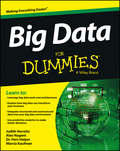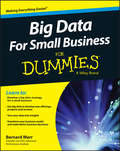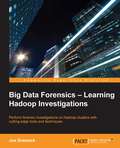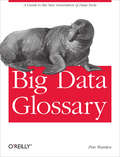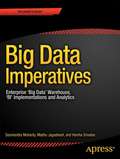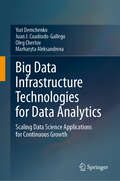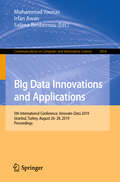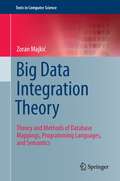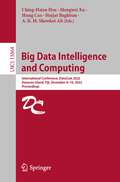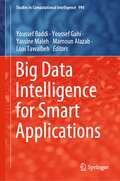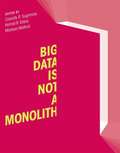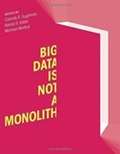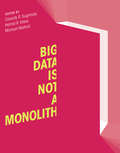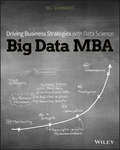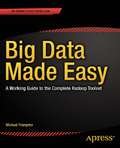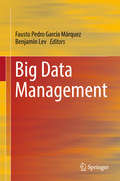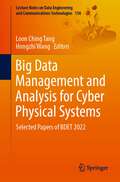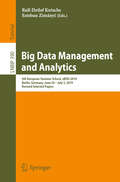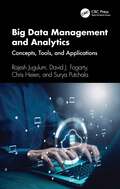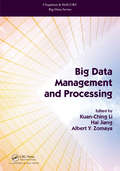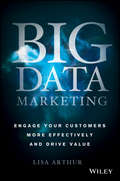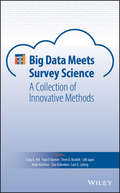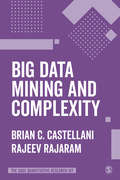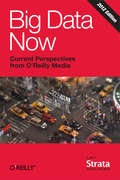- Table View
- List View
Big Data For Dummies
by Marcia Kaufman Fern Halper Hurwitz Alan NugentFind the right big data solution for your business or organizationBig data management is one of the major challenges facing business, industry, and not-for-profit organizations. Data sets such as customer transactions for a mega-retailer, weather patterns monitored by meteorologists, or social network activity can quickly outpace the capacity of traditional data management tools. If you need to develop or manage big data solutions, you'll appreciate how these four experts define, explain, and guide you through this new and often confusing concept. You'll learn what it is, why it matters, and how to choose and implement solutions that work.Effectively managing big data is an issue of growing importance to businesses, not-for-profit organizations, government, and IT professionalsAuthors are experts in information management, big data, and a variety of solutionsExplains big data in detail and discusses how to select and implement a solution, security concerns to consider, data storage and presentation issues, analytics, and much moreProvides essential information in a no-nonsense, easy-to-understand style that is empoweringBig Data For Dummies cuts through the confusion and helps you take charge of big data solutions for your organization.
Big Data For Small Business For Dummies
by Bernard MarrCapitalise on big data to add value to your small business Written by bestselling author and big data expert Bernard Marr, Big Data For Small Business For Dummies helps you understand what big data actually is--and how you can analyse and use it to improve your business. Free of confusing jargon and complemented with lots of step-by-step guidance and helpful advice, it quickly and painlessly helps you get the most from using big data in a small business. Business data has been around for a long time. Unfortunately, it was trapped away in overcrowded filing cabinets and on archaic floppy disks. Now, thanks to technology and new tools that display complex databases in a much simpler manner, small businesses can benefit from the big data that's been hiding right under their noses. With the help of this friendly guide, you'll discover how to get your hands on big data to develop new offerings, products and services; understand technological change; create an infrastructure; develop strategies; and make smarter business decisions. Shows you how to use big data to make sense of user activity on social networks and customer transactions Demonstrates how to capture, store, search, share, analyse and visualise analytics Helps you turn your data into actionable insights Explains how to use big data to your advantage in order to transform your small business If you're a small business owner or employee, Big Data For Small Business For Dummies helps you harness the hottest commodity on the market today in order to take your company to new heights.
Big Data Forensics – Learning Hadoop Investigations
by Joe SremackPerform forensic investigations on Hadoop clusters with cutting-edge tools and techniques About This Book * Identify, collect, and analyze Hadoop evidence forensically. * Learn about Hadoop's internals and Big Data file storage concepts * A step by step guide to help you perform forensic analysis using freely available tools Who This Book Is For This book is meant for statisticians and forensic analysts with basic knowledge of digital forensics. They do not need to know Big Data Forensics. If you are an IT professional, law enforcement professional, legal professional, or a student interested in Big Data and forensics, this book is the perfect hands-on guide for learning how to conduct Hadoop forensic investigations. Each topic and step in the forensic process is described in accessible language. What You Will Learn * Understand Hadoop internals and file storage * Collect and analyze Hadoop forensic evidence * Perform complex forensic analysis for fraud and other investigations * Use state-of-the-art forensic tools * Conduct interviews to identify Hadoop evidence * Create compelling presentations of your forensic findings * Understand how Big Data clusters operate * Apply advanced forensic techniques in an investigation, including file carving, statistical analysis, and more In Detail Big Data forensics is an important type of digital investigation that involves the identification, collection, and analysis of large-scale Big Data systems. Hadoop is one of the most popular Big Data solutions, and forensically investigating a Hadoop cluster requires specialized tools and techniques. With the explosion of Big Data, forensic investigators need to be prepared to analyze the petabytes of data stored in Hadoop clusters. Understanding Hadoop's operational structure and performing forensic analysis with court-accepted tools and best practices will help you conduct a successful investigation. Discover how to perform a complete forensic investigation of large-scale Hadoop clusters using the same tools and techniques employed by forensic experts. This book begins by taking you through the process of forensic investigation and the pitfalls to avoid. It will walk you through Hadoop's internals and architecture, and you will discover what types of information Hadoop stores and how to access that data. You will learn to identify Big Data evidence using techniques to survey a live system and interview witnesses. After setting up your own Hadoop system, you will collect evidence using techniques such as forensic imaging and application-based extractions. You will analyze Hadoop evidence using advanced tools and techniques to uncover events and statistical information. Finally, data visualization and evidence presentation techniques are covered to help you properly communicate your findings to any audience. Style and approach This book is a complete guide that follows every step of the forensic analysis process in detail. You will be guided through each key topic and step necessary to perform an investigation. Hands-on exercises are presented throughout the book, and technical reference guides and sample documents are included for real-world use.
Big Data Glossary: A Guide to the New Generation of Data Tools
by Pete WardenTo help you navigate the large number of new data tools available, this guide describes 60 of the most recent innovations, from NoSQL databases and MapReduce approaches to machine learning and visualization tools. Descriptions are based on first-hand experience with these tools in a production environment.This handy glossary also includes a chapter of key terms that help define many of these tool categories:NoSQL Databases—Document-oriented databases using a key/value interface rather than SQLMapReduce—Tools that support distributed computing on large datasetsStorage—Technologies for storing data in a distributed wayServers—Ways to rent computing power on remote machinesProcessing—Tools for extracting valuable information from large datasetsNatural Language Processing—Methods for extracting information from human-created textMachine Learning—Tools that automatically perform data analyses, based on results of a one-off analysisVisualization—Applications that present meaningful data graphicallyAcquisition—Techniques for cleaning up messy public data sourcesSerialization—Methods to convert data structure or object state into a storable format
Big Data Imperatives: Enterprise Big Data Warehouse, BI Implementations and Analytics
by Soumendra Mohanty Harsha Srivatsa Madhu JagadeeshBig Data Imperatives, focuses on resolving the key questions on everyone's mind: Which data matters? Do you have enough data volume to justify the usage? How you want to process this amount of data? How long do you really need to keep it active for your analysis, marketing, and BI applications? Big data is emerging from the realm of one-off projects to mainstream business adoption; however, the real value of big data is not in the overwhelming size of it, but more in its effective use. This book addresses the following big data characteristics: Very large, distributed aggregations of loosely structured data - often incomplete and inaccessible Petabytes/Exabytes of data Millions/billions of people providing/contributing to the context behind the data Flat schema's with few complex interrelationships Involves time-stamped events Made up of incomplete data Includes connections between data elements that must be probabilistically inferred Big Data Imperatives explains 'what big data can do'. It can batch process millions and billions of records both unstructured and structured much faster and cheaper. Big data analytics provide a platform to merge all analysis which enables data analysis to be more accurate, well-rounded, reliable and focused on a specific business capability. Big Data Imperatives describes the complementary nature of traditional data warehouses and big-data analytics platforms and how they feed each other. This book aims to bring the big data and analytics realms together with a greater focus on architectures that leverage the scale and power of big data and the ability to integrate and apply analytics principles to data which earlier was not accessible. This book can also be used as a handbook for practitioners; helping them on methodology,technical architecture, analytics techniques and best practices. At the same time, this book intends to hold the interest of those new to big data and analytics by giving them a deep insight into the realm of big data.
Big Data Infrastructure Technologies for Data Analytics: Scaling Data Science Applications for Continuous Growth
by Oleg Chertov Yuri Demchenko Juan J. Cuadrado-Gallego Marharyta AleksandrovaThis book provides a comprehensive overview and introduction to Big Data Infrastructure technologies, existing cloud-based platforms, and tools for Big Data processing and data analytics, combining both a conceptual approach in architecture design and a practical approach in technology selection and project implementation. Readers will learn the core functionality of major Big Data Infrastructure components and how they integrate to form a coherent solution with business benefits. Specific attention will be given to understanding and using the major Big Data platform Apache Hadoop ecosystem, its main functional components MapReduce, HBase, Hive, Pig, Spark and streaming analytics. The book includes topics related to enterprise and research data management and governance and explains modern approaches to cloud and Big Data security and compliance. The book covers two knowledge areas defined in the EDISON Data Science Framework (EDSF): Data Science Engineering and Data Management and Governance and can be used as a textbook for university courses or provide a basis for practitioners for further self-study and practical use of Big Data technologies and competent evaluation and implementation of practical projects in their organizations.
Big Data Innovations and Applications: 5th International Conference, Innovate-Data 2019, Istanbul, Turkey, August 26–28, 2019, Proceedings (Communications in Computer and Information Science #1054)
by Muhammad Younas Irfan Awan Salima BenbernouThis volume constitutes the refereed proceedings of the 5th International Conference on Big Data Innovations and Applications, Innovate-Data 2019, held in Istanbul, Turkey, in August 2019.The 15 revised full papers and 1 short paper presented in this volume were carefully reviewed and selected from 48 submissions. The papers are organized in topical sections on advances in big data systems; machine learning and data analytics; big data innovation and applications; security and risk analysis.
Big Data Integration Theory: Theory and Methods of Database Mappings, Programming Languages, and Semantics (Texts in Computer Science)
by Zoran MajkićThis book presents a novel approach to database concepts, describing a categorical logic for database schema mapping based on views, within a framework for database integration/exchange and peer-to-peer. Database mappings, database programming languages, and denotational and operational semantics are discussed in depth. An analysis method is also developed that combines techniques from second order logic, data modeling, co-algebras and functorial categorial semantics. Features: provides an introduction to logics, co-algebras, databases, schema mappings and category theory; describes the core concepts of big data integration theory, with examples; examines the properties of the DB category; defines the categorial RDB machine; presents full operational semantics for database mappings; discusses matching and merging operators for databases, universal algebra considerations and algebraic lattices of the databases; explores the relationship of the database weak monoidal topos w. r. t. intuitionistic logic.
Big Data Intelligence and Computing: International Conference, DataCom 2022, Denarau Island, Fiji, December 8–10, 2022, Proceedings (Lecture Notes in Computer Science #13864)
by Ching-Hsien Hsu A. B. M. Shawkat Ali Hung Cao Mengwei Xu Hojjat BaghbanThis book constitutes the proceedings of the International Conference on Big Data Intelligence and Computing, DataCom 2022, which took place in Denarau Island, Fiji, in December 2022. The 30 full papers included in this volume were carefully reviewed and selected from 88 submissions. The papers detail big data analytics solutions, distributed computation paradigms, on-demand services, autonomic systems, and pervasive applications.
Big Data Intelligence for Smart Applications (Studies in Computational Intelligence #994)
by Yassine Maleh Mamoun Alazab Youssef Baddi Loai Tawalbeh Youssef GahiToday, the use of machine intelligence, expert systems, and analytical technologies combined with Big Data is the natural evolution of both disciplines. As a result, there is a pressing need for new and innovative algorithms to help us find effective and practical solutions for smart applications such as smart cities, IoT, healthcare, and cybersecurity.This book presents the latest advances in big data intelligence for smart applications. It explores several problems and their solutions regarding computational intelligence and big data for smart applications. It also discusses new models, practical solutions,and technological advances related to developing and transforming cities through machine intelligence and big data models and techniques. This book is helpful for students and researchers as well as practitioners.
Big Data Is Not a Monolith
by Cassidy R. Sugimoto Hamid R. Ekbia Michael MattioliBig data is ubiquitous but heterogeneous. Big data can be used to tally clicks and traffic on web pages, find patterns in stock trades, track consumer preferences, identify linguistic correlations in large corpuses of texts. This book examines big data not as an undifferentiated whole but contextually, investigating the varied challenges posed by big data for health, science, law, commerce, and politics. Taken together, the chapters reveal a complex set of problems, practices, and policies.The advent of big data methodologies has challenged the theory-driven approach to scientific knowledge in favor of a data-driven one. Social media platforms and self-tracking tools change the way we see ourselves and others. The collection of data by corporations and government threatens privacy while promoting transparency. Meanwhile, politicians, policy makers, and ethicists are ill-prepared to deal with big data's ramifications. The contributors look at big data's effect on individuals as it exerts social control through monitoring, mining, and manipulation; big data and society, examining both its empowering and its constraining effects; big data and science, considering issues of data governance, provenance, reuse, and trust; and big data and organizations, discussing data responsibility, "data harm," and decision making.ContributorsRyan Abbott, Cristina Alaimo, Kent R. Anderson, Mark Andrejevic, Diane E. Bailey, Mike Bailey, Mark Burdon, Fred H. Cate, Jorge L. Contreras, Simon DeDeo, Hamid R. Ekbia, Allison Goodwell, Jannis Kallinikos, Inna Kouper, M. Lynne Markus, Michael Mattioli, Paul Ohm, Scott Peppet, Beth Plale, Jason Portenoy, Julie Rennecker, Katie Shilton, Dan Sholler, Cassidy R. Sugimoto, Isuru Suriarachchi, Jevin D. West
Big Data Is Not a Monolith
by Cassidy R. Sugimoto Hamid R. Ekbia Michael MattioliBig data is ubiquitous but heterogeneous. Big data can be used to tally clicks and traffic on web pages, find patterns in stock trades, track consumer preferences, identify linguistic correlations in large corpuses of texts. This book examines big data not as an undifferentiated whole but contextually, investigating the varied challenges posed by big data for health, science, law, commerce, and politics. Taken together, the chapters reveal a complex set of problems, practices, and policies.The advent of big data methodologies has challenged the theory-driven approach to scientific knowledge in favor of a data-driven one. Social media platforms and self-tracking tools change the way we see ourselves and others. The collection of data by corporations and government threatens privacy while promoting transparency. Meanwhile, politicians, policy makers, and ethicists are ill-prepared to deal with big data's ramifications. The contributors look at big data's effect on individuals as it exerts social control through monitoring, mining, and manipulation; big data and society, examining both its empowering and its constraining effects; big data and science, considering issues of data governance, provenance, reuse, and trust; and big data and organizations, discussing data responsibility, "data harm," and decision making.ContributorsRyan Abbott, Cristina Alaimo, Kent R. Anderson, Mark Andrejevic, Diane E. Bailey, Mike Bailey, Mark Burdon, Fred H. Cate, Jorge L. Contreras, Simon DeDeo, Hamid R. Ekbia, Allison Goodwell, Jannis Kallinikos, Inna Kouper, M. Lynne Markus, Michael Mattioli, Paul Ohm, Scott Peppet, Beth Plale, Jason Portenoy, Julie Rennecker, Katie Shilton, Dan Sholler, Cassidy R. Sugimoto, Isuru Suriarachchi, Jevin D. West
Big Data Is Not a Monolith (Information Policy)
by Cassidy R. Sugimoto Hamid R. Ekbia Michael MattioliPerspectives on the varied challenges posed by big data for health, science, law, commerce, and politics.Big data is ubiquitous but heterogeneous. Big data can be used to tally clicks and traffic on web pages, find patterns in stock trades, track consumer preferences, identify linguistic correlations in large corpuses of texts. This book examines big data not as an undifferentiated whole but contextually, investigating the varied challenges posed by big data for health, science, law, commerce, and politics. Taken together, the chapters reveal a complex set of problems, practices, and policies.The advent of big data methodologies has challenged the theory-driven approach to scientific knowledge in favor of a data-driven one. Social media platforms and self-tracking tools change the way we see ourselves and others. The collection of data by corporations and government threatens privacy while promoting transparency. Meanwhile, politicians, policy makers, and ethicists are ill-prepared to deal with big data's ramifications. The contributors look at big data's effect on individuals as it exerts social control through monitoring, mining, and manipulation; big data and society, examining both its empowering and its constraining effects; big data and science, considering issues of data governance, provenance, reuse, and trust; and big data and organizations, discussing data responsibility, “data harm,” and decision making.ContributorsRyan Abbott, Cristina Alaimo, Kent R. Anderson, Mark Andrejevic, Diane E. Bailey, Mike Bailey, Mark Burdon, Fred H. Cate, Jorge L. Contreras, Simon DeDeo, Hamid R. Ekbia, Allison Goodwell, Jannis Kallinikos, Inna Kouper, M. Lynne Markus, Michael Mattioli, Paul Ohm, Scott Peppet, Beth Plale, Jason Portenoy, Julie Rennecker, Katie Shilton, Dan Sholler, Cassidy R. Sugimoto, Isuru Suriarachchi, Jevin D. West
Big Data MBA
by Bill SchmarzoIntegrate big data into business to drive competitive advantage and sustainable success Big Data MBA brings insight and expertise to leveraging big data in business so you can harness the power of analytics and gain a true business advantage. Based on a practical framework with supporting methodology and hands-on exercises, this book helps identify where and how big data can help you transform your business. You'll learn how to exploit new sources of customer, product, and operational data, coupled with advanced analytics and data science, to optimize key processes, uncover monetization opportunities, and create new sources of competitive differentiation. The discussion includes guidelines for operationalizing analytics, optimal organizational structure, and using analytic insights throughout your organization's user experience to customers and front-end employees alike. You'll learn to "think like a data scientist" as you build upon the decisions your business is trying to make, the hypotheses you need to test, and the predictions you need to produce. Business stakeholders no longer need to relinquish control of data and analytics to IT. In fact, they must champion the organization's data collection and analysis efforts. This book is a primer on the business approach to analytics, providing the practical understanding you need to convert data into opportunity. Understand where and how to leverage big data Integrate analytics into everyday operations Structure your organization to drive analytic insights Optimize processes, uncover opportunities, and stand out from the rest Help business stakeholders to "think like a data scientist" Understand appropriate business application of different analytic techniques If you want data to transform your business, you need to know how to put it to use. Big Data MBA shows you how to implement big data and analytics to make better decisions.
Big Data Made Easy: A Working Guide to the Complete Hadoop Toolset
by Michael FramptonMany corporations are finding that the size of their data sets are outgrowing the capability of their systems to store and process them. The data is becoming too big to manage and use with traditional tools. The solution: implementing a big data system. As Big Data Made Easy: A Working Guide to the Complete Hadoop Toolset shows, Apache Hadoop offers a scalable, fault-tolerant system for storing and processing data in parallel. It has a very rich toolset that allows for storage (Hadoop), configuration (YARN and ZooKeeper), collection (Nutch and Solr), processing (Storm, Pig, and Map Reduce), scheduling (Oozie), moving (Sqoop and Avro), monitoring (Chukwa, Ambari, and Hue), testing (Big Top), and analysis (Hive). The problem is that the Internet offers IT pros wading into big data many versions of the truth and some outright falsehoods born of ignorance. What is needed is a book just like this one: a wide-ranging but easily understood set of instructions to explain where to get Hadoop tools, what they can do, how to install them, how to configure them, how to integrate them, and how to use them successfully. And you need an expert who has worked in this area for a decade--someone just like author and big data expert Mike Frampton. Big Data Made Easy approaches the problem of managing massive data sets from a systems perspective, and it explains the roles for each project (like architect and tester, for example) and shows how the Hadoop toolset can be used at each system stage. It explains, in an easily understood manner and through numerous examples, how to use each tool. The book also explains the sliding scale of tools available depending upon data size and when and how to use them. Big Data Made Easy shows developers and architects, as well as testers and project managers, how to: Store big dataConfigure big dataProcess big dataSchedule processesMove data among SQL and NoSQL systemsMonitor dataPerform big data analytics Report on big data processes and projectsTest big data systemsBig Data Made Easy also explains the best part, which is that this toolset is free. Anyone can download it and--with the help of this book--start to use it within a day. With the skills this book will teach you under your belt, you will add value to your company or client immediately, not to mention your career.
Big Data Management
by Fausto Pedro García Márquez Benjamin LevThis book focuses on the analytic principles of business practice and big data. Specifically, it provides an interface between the main disciplines of engineering/technology and the organizational and administrative aspects of management, serving as a complement to books in other disciplines such as economics, finance, marketing and risk analysis. The contributors present their areas of expertise, together with essential case studies that illustrate the successful application of engineering management theories in real-life examples.
Big Data Management and Analysis for Cyber Physical Systems: Selected Papers of BDET 2022 (Lecture Notes on Data Engineering and Communications Technologies #150)
by Hongzhi Wang Loon Ching TangThis book consists of selected and peer-reviewed papers presented at 2022 4th International Conference on Big Data Engineering and Technology (BDET), held during April 22–24, 2022, in Singapore. As IT infrastructure and data management technologies have become critical assets and capabilities for today’s enterprises, this book aims to be part of the effort in contributing to their development. In particular, the BDET conference series aims to provide the much needed forum for researchers and practitioners across the world who are actively engaged in advancing research and raising awareness of the many challenges in the diverse field of big data engineering and technology to share their research outcomes and bounce ideas off their international colleagues. Over the last few years, the conference series has brought together the latest developments of novel theory in big data, algorithm and applications, emerging standards for big data, big data infrastructure, MapReduce and cloud computing, big data visualization, big data curation and management, big data semantics, scientific discovery and intelligence, which collectively form parts of the cyber-physical systems of interest. It is hoped that the book will prove useful to students, researchers, and professionals working in the field of big data engineering and applications in cyber-physical systems.
Big Data Management and Analytics: 9th European Summer School, eBISS 2019, Berlin, Germany, June 30 – July 5, 2019, Revised Selected Papers (Lecture Notes in Business Information Processing #390)
by Esteban Zimányi Ralf-Detlef KutscheThis book constitutes 5 revised tutorial lectures of the 9th European Business Intelligence and Big Data Summer School, eBISS 2019, held in Berlin, Germany, during June 30 – July 5, 2019. The tutorials were given by renowned experts and covered advanced aspects of business intelligence and big data. This summer school, presented by leading researchers in the field, represented an opportunity for postgraduate students to equip themselves with the theoretical and practical skills necessary for developing challenging business intelligence applications.
Big Data Management and Analytics: Concepts, Tools, and Applications
by Rajesh Jugulum David J. Fogarty Chris Heien Surya PutchalaAs more companies go digital and conduct their business online, this book provides practical examples of how they can better manage their data and use it to generate maximum value. It offers an integrated approach by treating data as an asset and discusses how to preserve and protect it just like any other corporate asset.Big Data Management and Analytics: Concepts, Tools, and Applications illustrates effective strategies for managing, governing, and analyzing big data to gain a competitive edge for companies utilizing big data and analytics. It offers a comprehensive guide on methods, tools, and concepts to efficiently manage and analyze big data in order to make informed decisions. Additionally, this book explores the significance of artificial intelligence and machine learning in leveraging big data and how they can be optimized in a well-structured environment. This book also emphasizes treating big data as a valuable asset and outlines strategies for preserving and safeguarding it like any other corporate asset. The inclusion of case studies ensures that the methodologies and concepts presented can be easily implemented in day-to-day operations.Given the current significance of big data in the business world, this book equips readers with the necessary skills to effectively manage this valuable asset. It is tailored for practitioners, students, and professionals working in data mining, big data, and machine learning across various industries, including manufacturing.
Big Data Management and Processing (Chapman & Hall/CRC Big Data Series)
by Kuan-Ching Li, Hai Jiang and Albert Y. ZomayaFrom the Foreword: "Big Data Management and Processing is [a] state-of-the-art book that deals with a wide range of topical themes in the field of Big Data. The book, which probes many issues related to this exciting and rapidly growing field, covers processing, management, analytics, and applications... [It] is a very valuable addition to the literature. It will serve as a source of up-to-date research in this continuously developing area. The book also provides an opportunity for researchers to explore the use of advanced computing technologies and their impact on enhancing our capabilities to conduct more sophisticated studies." ---Sartaj Sahni, University of Florida, USA "Big Data Management and Processing covers the latest Big Data research results in processing, analytics, management and applications. Both fundamental insights and representative applications are provided. This book is a timely and valuable resource for students, researchers and seasoned practitioners in Big Data fields. --Hai Jin, Huazhong University of Science and Technology, China Big Data Management and Processing explores a range of big data related issues and their impact on the design of new computing systems. The twenty-one chapters were carefully selected and feature contributions from several outstanding researchers. The book endeavors to strike a balance between theoretical and practical coverage of innovative problem solving techniques for a range of platforms. It serves as a repository of paradigms, technologies, and applications that target different facets of big data computing systems. The first part of the book explores energy and resource management issues, as well as legal compliance and quality management for Big Data. It covers In-Memory computing and In-Memory data grids, as well as co-scheduling for high performance computing applications. The second part of the book includes comprehensive coverage of Hadoop and Spark, along with security, privacy, and trust challenges and solutions. The latter part of the book covers mining and clustering in Big Data, and includes applications in genomics, hospital big data processing, and vehicular cloud computing. The book also analyzes funding for Big Data projects.
Big Data Marketing
by Lisa ArthurLeverage big data insights to improve customer experiences and insure business successMany of today's businesses find themselves caught in a snarl of internal data, paralyzed by internal silos, and executing antiquated marketing approaches. As a result, consumers are losing patience, shareholders are clamoring for growth and differentiation, and marketers are left struggling to untangle the massive mess. Big Data Marketing provides a strategic road map for executives who want to clear the chaos and start driving competitive advantage and top line growth. Using real-world examples, non-technical language, additional downloadable resources, and a healthy dose of humor, Big Data Marketing will help you discover the remedy offered by data-driven marketing.Explains how marketers can use data to learn what they need to knowDetails strategies to drive marketing relevance and Return On Marketing Investment (ROMI)Provides a five-step approach in the journey to a more data-driven marketing organizationAuthor Lisa Arthur, the Chief Marketing Officer for Teradata Applications, the leader in integrated marketing software, meets with thousands of CMOs and marketing professionals annually through public speaking and eventsBig Data Marketing reveals patterns in your customers' behavior and proven ways to elevate customer experiences. Leverage these insights to insure your business's success.
Big Data Meets Survey Science: A Collection of Innovative Methods (Wiley Series in Survey Methodology)
by Craig A HillOffers a clear view of the utility and place for survey data within the broader Big Data ecosystem This book presents a collection of snapshots from two sides of the Big Data perspective. It assembles an array of tangible tools, methods, and approaches that illustrate how Big Data sources and methods are being used in the survey and social sciences to improve official statistics and estimates for human populations. It also provides examples of how survey data are being used to evaluate and improve the quality of insights derived from Big Data. Big Data Meets Survey Science: A Collection of Innovative Methods shows how survey data and Big Data are used together for the benefit of one or more sources of data, with numerous chapters providing consistent illustrations and examples of survey data enriching the evaluation of Big Data sources. Examples of how machine learning, data mining, and other data science techniques are inserted into virtually every stage of the survey lifecycle are presented. Topics covered include: Total Error Frameworks for Found Data; Performance and Sensitivities of Home Detection on Mobile Phone Data; Assessing Community Wellbeing Using Google Street View and Satellite Imagery; Using Surveys to Build and Assess RBS Religious Flag; and more. Presents groundbreaking survey methods being utilized today in the field of Big Data Explores how machine learning methods can be applied to the design, collection, and analysis of social science data Filled with examples and illustrations that show how survey data benefits Big Data evaluation Covers methods and applications used in combining Big Data with survey statistics Examines regulations as well as ethical and privacy issues Big Data Meets Survey Science: A Collection of Innovative Methods is an excellent book for both the survey and social science communities as they learn to capitalize on this new revolution. It will also appeal to the broader data and computer science communities looking for new areas of application for emerging methods and data sources.
Big Data Mining and Complexity (The SAGE Quantitative Research Kit)
by Rajeev Rajaram Brian C. CastellaniThis book offers a much needed critical introduction to data mining and ‘big data’. Supported by multiple case studies and examples, the authors provide: Digestible overviews of key terms and concepts relevant to using social media data in quantitative research. A critical review of data mining and ‘big data’ from a complexity science perspective, including its future potential and limitations A practical exploration of the challenges of putting together and managing a ‘big data’ database An evaluation of the core mathematical and conceptual frameworks, grounded in a case-based computational modeling perspective, which form the foundations of all data mining techniques Part of The SAGE Quantitative Research Kit, this book will give you the know-how and confidence needed to succeed on your quantitative research journey.
Big Data Mining and Complexity (The SAGE Quantitative Research Kit)
by Rajeev Rajaram Brian C. CastellaniThis book offers a much needed critical introduction to data mining and ‘big data’. Supported by multiple case studies and examples, the authors provide: Digestible overviews of key terms and concepts relevant to using social media data in quantitative research. A critical review of data mining and ‘big data’ from a complexity science perspective, including its future potential and limitations A practical exploration of the challenges of putting together and managing a ‘big data’ database An evaluation of the core mathematical and conceptual frameworks, grounded in a case-based computational modeling perspective, which form the foundations of all data mining techniques Part of The SAGE Quantitative Research Kit, this book will give you the know-how and confidence needed to succeed on your quantitative research journey.
Big Data Now: 2012 Edition
by Inc. O'Reilly MediaThe Big Data Now anthology is relevant to anyone who creates, collectsor relies upon data. It's not just a technical book or just a businessguide. Data is ubiquitous and it doesn't pay much attention toborders, so we've calibrated our coverage to follow it wherever itgoes.In the first edition of Big Data Now, the O'Reilly team tracked thebirth and early development of data tools and data science. Now, withthis second edition, we're seeing what happens when big data grows up:how it's being applied, where it's playing a role, and theconsequences -- good and bad alike -- of data's ascendance.We've organized the second edition of Big Data Now into five areas:Getting Up to Speed With Big Data -- Essential information on thestructures and definitions of big data.Big Data Tools, Techniques, and Strategies -- Expert guidance forturning big data theories into big data products.The Application of Big Data -- Examples of big data in action,including a look at the downside of data.What to Watch for in Big Data -- Thoughts on how big data will evolveand the role it will play across industries and domains.Big Data and Health Care -- A special section exploring thepossibilities that arise when data and health care come together.
